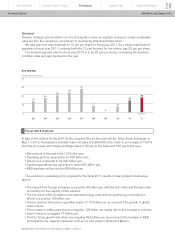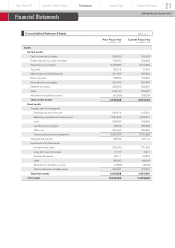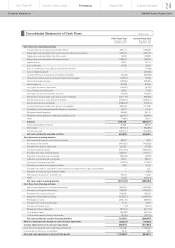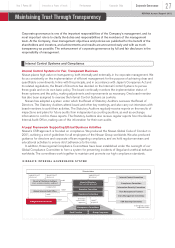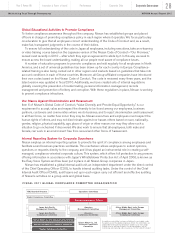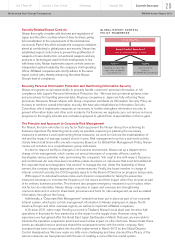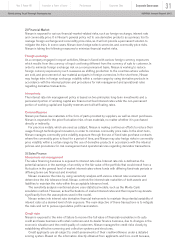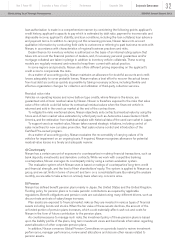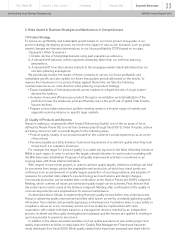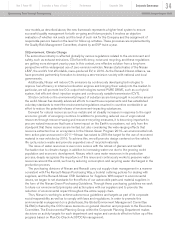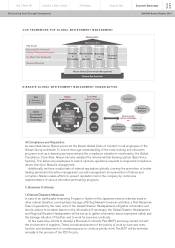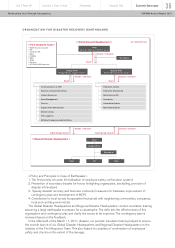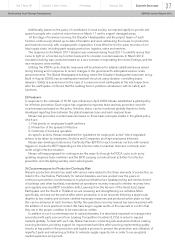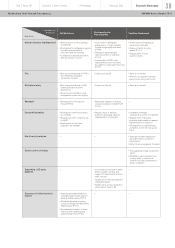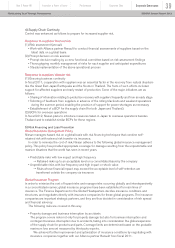Nissan 2012 Annual Report Download - page 30
Download and view the complete annual report
Please find page 30 of the 2012 Nissan annual report below. You can navigate through the pages in the report by either clicking on the pages listed below, or by using the keyword search tool below to find specific information within the annual report.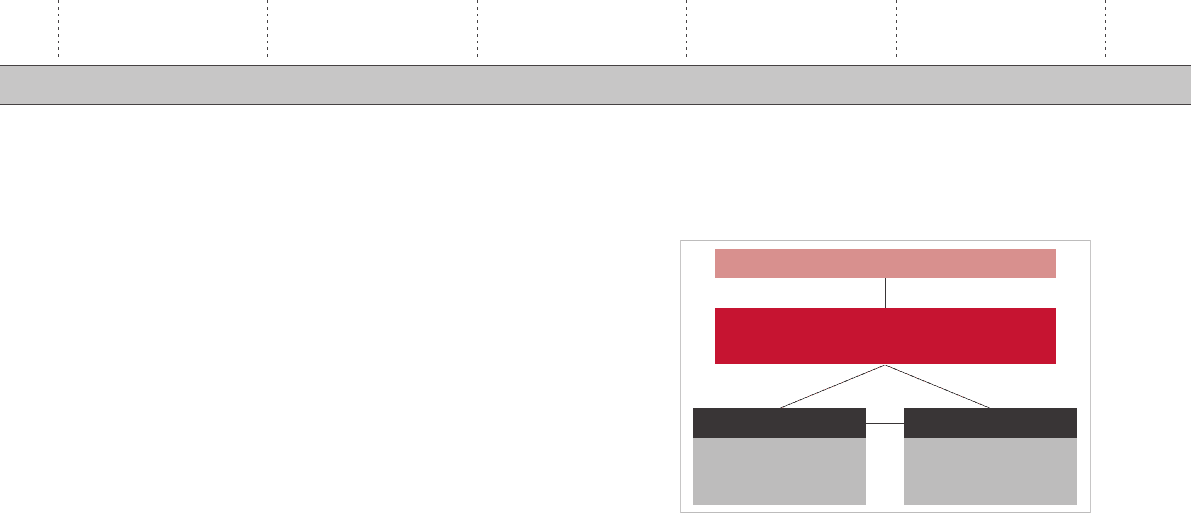
GLOBAL EXPORT CONTROL
POLICY FRAMEWORK
Chief Operating Officer
Export Control Secretariat
(within the Global Headquarters in Japan)
Functions
Marketing and sales, R&D,
supply chain management,
IT, production, etc.
Regions
Japan/Asia Pacific,
Americas,
Africa/Middle East/India/Europe
Ensuring Personal Information Protection and Reinforcing Information Security
Nissan recognizes social responsibility to properly handle customers’ personal information, in full
compliance with Japan’s Personal Information Protection Act. We have set up internal systems, rules
and procedures for handling personal data. All group companies in Japan are fully enforcing these
processes. Moreover, Nissan shares with Group companies worldwide its Information Security Policy as
its basis to reinforce overall information security. We have also established an Information Security
Committee, which implements measures as necessary to further strengthen information security to
prevent information leaks and other such incidents. Furthermore, we regularly carry out various in-house
programs to thoroughly educate and motivate employees to uphold their responsibilities in this re-gard.
The Principle and Approach to Corporate Risk Management
For Nissan, the term risk refers to any factor that may prevent the Nissan Group from achieving its
business objectives. By detecting risk as early as possible, examining it, planning the necessary
measures to address it and implementing those measures, we work to minimize the materialization of
risk and the impact of damage caused, should it arise. Risk management must be a real-world activity
closely linked at all times with concrete measures. Based on its Global Risk Management Policy, Nissan
carries out activities on a comprehensive, group-wide basis.
In order to respond swiftly to changes in its business environment, Nissan set up a department in
charge of risk management, which carries out annual interviews of corporate officers, carefully
investigates various potential risks, and revising the company’s “risk map” in line with impact, frequency
and control level. An executive-level committee makes decisions on risk issues that must be handled at
the corporate level and designates “risk owners” to manage the risk. Under the leadership of these
owners, the company designs appropriate countermeasures. Finally, the board member in charge of
internal controls (currently, the COO) regularly reports to the Board of Directors on progress being made.
With respect to individual business risks, each division is responsible for taking the preventive
measures necessary to minimize the frequency of risk issues and their impact when they do arise as part
of its ordinary business activities. The divisions also prepare emergency measures to put in place when
risk factors do materialize. Nissan Group companies in Japan and overseas are strengthening
communication and in order to share basic processes and tools for risk management, as well as related
information, throughout the Group.
Additionally, a “Corporate Risk Management” website has been put in place as part of our corporate
intranet system, which puts out risk management information to Nissan employees in Japan, North
America, Europe and other overseas regions, as well as to important affiliated companies.
In October 2011, when major flooding occurred in Thailand, Nissan’s local plant was forced to halt
operations in that area for four weeks due to the impact on the supply chain. However, using the
experience we had gained after the Great East Japan Earthquake in March that year, we were able to
minimize the operation suspension period and avoid undue impact on other factories. Nissan treats these
events as valuable lessons and have shared the subsequent review with the entire company. New
scenarios have been incorporated into the drills implemented in March 2012 by the Global Disaster
Control Headquarters. We have made our drills more challenging and have checked the efficacy of the
various measures we have planned with the aim of creating a more effective overall system.
Security-Related Export Controls
Nissan thoroughly complies with the laws and regulations of
Japan and the other countries where it does business, giving
full consideration to the requirements of the international
community. Part of this effort includes the company’s initiatives
aimed at contributing to global peace and security. Nissan has
established export control rules to prevent the proliferation of
weapons of mass destruction, conventional weapons and any
products or technologies used for their development. In line
with these rules, Nissan implements export controls under an
independent system headed by the company’s chief operating
officer. Affiliated companies also strictly adhere to the same
export control rules, thereby enhancing the entire Nissan
Group’s level of compliance.
Innovation & Power of brandYear 2 Power 88 Performance Corporate Data
Corporate Governance 29
NISSAN Annual Report 2012Maintaining Trust Through Transparency



